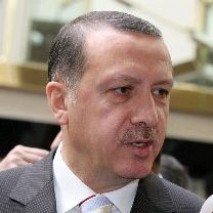
Turkey's victorious Justice and Development Party is celebrating, but it faces a series of challenges, including the lingering tension over the role of Islam in Turkish society and the selection of a new president.
Realizing what lies ahead, Prime Minister Recep Tayyip Erdogan was careful not to be too triumphant in accepting victory.
In a low-key speech, he struck a conciliatory note.
"Democracy and the republic came out stronger with this election," he said. "That's why the winners of this election are our nation, our people's future and secularism."
Though Mr. Erdogan's party won a large popular mandate, analysts say his close alliance with Deputy Prime Minister Abdullah Gul could cause some problems in the coming paliamentary vote for president.
Gul, a devout Muslim, has indicated he would resume his bid for the presidency despite opposition from the military and the secular establishment. The opposition in parliament, fearful that Gul as president would chip away at Turkey's secular foundations, blocked his candidacy last April, forcing the country into early general elections.
Prime Minister Erdogan has said he wants to avoid fresh tensions and has vowed to consult with the opposition over who will succeed the current president, staunch secularist Ahmet Necdet Sezer.
Burak Bekdil of the Turkish Daily News says the prime minister will likely try to avoid any more political confrontation.
"Well I am confident there will be a compromise candidate," Bekdil said, "most probably from the AK party ranks, but at the same time someone who is acceptable to the rest of the society and state establishment."
But other political observers say the prime minister may feel pressure from within his party to stick with Gul.
According to AK sources, support for Gul has soared within the party. In a news conference Wednesday, Gul himself indicated he still in the running for president.
"In making my decision I am very clear, that I am not in a position to ignore the powerful message from people attending election rallies throughout the country," Gul said. "Nobody can impose a political ban on someone else, so why shouldn't I be candidate. All these things will be revealed in the coming days. But for all of us our compass should be democracy."
But even if Mr. Erdogan decides to back his close friend and ally, his party does not have enough votes in parliament to muster the 367-mamber majority Gul will need to be elected.
Political columnist and former government adviser Nuray Mert says Mr. Erdogan faces a dilemma.
"Well because Gul seems quite insistent in running for the presidency and the general atmosphere is against the idea," he said. "As far as I can observe, everybody is looking forward to the second which is stable economically but also politically. For political stablilty, there must be a compromise and consensus on the issue of the presidency and Gul can hardly be the name of compromise and consensus."
Clearly, by siding with Gul, the prime minister's risks reopening deep divisions within Turkey and putting at risk the political capital he has accumulated while in office. Political observers say the decision he makes could well determine the future of his next term in office.














